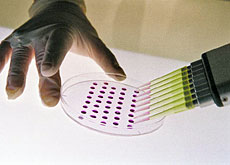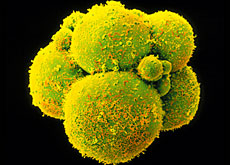Gene manipulation issue revived in Switzerland

A decision by the British parliament to allow the creation of hybrid human-animal embryos has revived the debate around the ethics of genetic manipulation.
Swiss legislation permits excess stem cells to be used for research, but forbids the production of clones or hybrids for this purpose.
Many scientists think the time has come for the law to be relaxed if Switzerland is to keep its place at the cutting edge of research.
Hans Hengartner, professor of immunology at the Federal Institute of Technology in Zurich, told the popular Blick newspaper that the Swiss ban is driving young researchers abroad.
The purpose of creating hybrid embryos is to help research into a number of diseases, including Alzheimers and Parkinsons.
Although some of the press has spoken of creating “monsters”, the British legislation stipulates that any embryos created must be destroyed within 14 days.
Deeply disquieting
Nevertheless, some people find the idea of hybrid cells deeply disquieting. Dr Ruth Baumann-Hölzle, a member of the Swiss National Ethics Commission on Human Medicine, told swissinfo that yet again “a basic barrier” had been crossed.
Baumann-Hölzle, who heads the Interdisciplinary Institute for Ethics in Health Care, Dialog Ethik in Zurich, feels there is a danger that society is losing its way.
“From a religious point of view you can ask whether this is not an affront to the concept of Man created in the image of God. But in a pluralistic society we don’t have a hard and fast image of Man, and that is why we find it so hard to take a stand.”
But Alex Mauron, a former member of the commission and professor of biomedical ethics at Geneva University is “completely in favour” of this kind of research.
“The concept of the human being necessarily develops in keeping with scientific knowledge. It is not the role of ethics to protect old ideas of human nature against scientific discoveries,” he told swissinfo.
For Mauron the task of public ethics is to protect persons against indisputable harm. “Here no damage is being done to anyone,” he said.
Baumann-Hölzle is worried about the future.
“I personally have a problem, because I think we are increasingly exploiting human life as we have exploited non-human nature, and we cannot assess the consequences.”
This is not an argument that Mauron can accept.
“If you think you have to ban everything before you start because you can never foresee the consequences, I would call that a rejection of all idea of progress.”
Costs and benefits
But who benefits and who loses from this kind of research? Baumann-Hölzle is concerned that money put into such very costly experiments will be diverted from research that could help many more people.
In Switzerland research funds come partly from the state; parliament has approved a new national research programme for stem cell research. It is due to receive about SFr10 million ($9.74 million) over five years.
Given the state’s collaboration with private companies, economic interests also come into play when determining priorities, Baumann-Hölzle pointed out.
“The pretext is always that we need to alleviate human suffering, but in many areas where there is a huge amount of suffering there is no research because it is not profitable.”
Mauron warned against confusing the two very different issues of banning research and not allocating funds.
“You can believe the priorities should be somewhere else, you are entitled to your opinion, but that is not a reason to ban something.”
Injustice?
He sees injustice being inflicted on people who could benefit from the research.
“An unfounded ban is unjust in itself, and also ends up creating further injustice.”
In 2004 Swiss voters approved research into human embryos in the framework of stem cell research, which Mauron sees as evidence of a gradual shift in public opinion, although he accepts that many still have misgivings.
“It is difficult to imagine the Swiss adopting a very liberal course like the one being taken in Britain now,” he admitted.
If Swiss President Pascal Couchepin – whose ministerial responsibilities include health – is typical of public opinion, supporters of more liberal legislation have a long way to go.
“I personally am convinced that a dangerous boundary is being crossed with such experiments,” he told the Blick.
“Thank goodness this kind of thing is not possible in Switzerland.”
swissinfo, Julia Slater
Hybrid embryos are created by transferring nuclei containing DNA from human cells into animal eggs – taken from cows – that have had almost all of their genetic information removed.
The resulting embryos are more than 99% human.
The only animal DNA is in the mitochondria which are not part of the nucleus.
Using cow eggs avoids the need to use women as egg donors for stem cell reseach.
Taking eggs from women requires hormone treatment, which entails a certain amount of risk.
The creation of hybrid embryos is currently banned in Switzerland, France, Germany and Italy.

In compliance with the JTI standards
More: SWI swissinfo.ch certified by the Journalism Trust Initiative











You can find an overview of ongoing debates with our journalists here . Please join us!
If you want to start a conversation about a topic raised in this article or want to report factual errors, email us at english@swissinfo.ch.